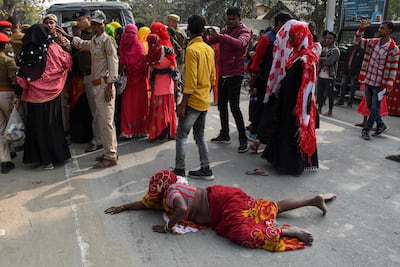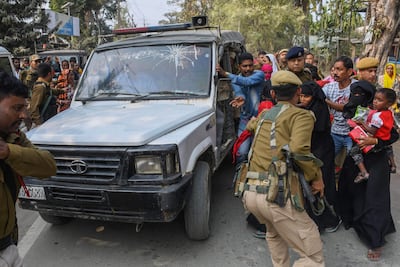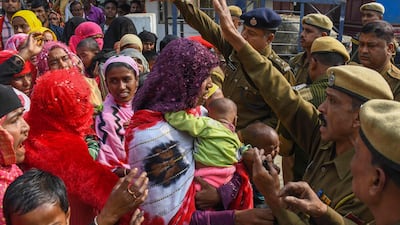Khusbhoo Begum, a widowed mother of two in India’s Assam state, took her own life on February 3 as local police began making arrests in a sweeping crackdown on child marriage.
Ms Begum, 27, reportedly feared that her father would be arrested for marrying her off in 2012, when she was 16. She was living with her parents after her husband died two years ago from Covid-19.
The crackdown ordered by Assam chief minister Himanta Biswa Sarma has triggered protests by the families of those detained and divided opinion among women's rights activists about the best way to tackle the widespread but illegal practice.
Indian law prohibits the marriage of women below 18 and of men under 21, but the country of 1.4 billion has 223 million child brides — a third of the global total, according to a Unicef report released in 2020.
Mr Sarma cited the alarming rate of underage pregnancies in Assam — 12 per cent compared with the national average of 6.8 per cent, according to a National Family Health Survey report released last year — when ordering police to take action against fathers, grooms, matchmakers and religious officials involved in child marriages over the past seven years.
The Assam government blames child marriage for the state's high maternal and infant mortality rate.
So far, nearly 2,800 people, including about 80 women, have been arrested under the Protection of Children from Sexual Offences Act, or Pocso, and the Prohibition of Child Marriage Act, 2006. Convictions carry sentences of up to two years of rigorous imprisonment — jail time with hard labour — and a fine of 100,000 rupees ($1,200).
Authorities have turned sports stadiums and transit camps into temporary jails to accommodate the large number of people arrested.
Most of the arrests are in predominantly Muslim districts, prompting opposition parties to level accusations of religious bias against Mr Sarma, a member of Prime Minister Narendra Modi's Hindu nationalist Bharatiya Janata Party.

Women's rights activists criticised Mr Sarma’s “iron fist” approach, saying it will do more harm to women than good.
Child marriage has been common in India for centuries for a variety of reasons, including deeply-rooted religious beliefs and traditions, a patriarchal system, poverty, lack of education and gender inequality.
Millions of Indian parents still hold conservative views that drive them to marry off their children at a young age, particularly their daughters, who are largely seen as a financial burden and liability to the honour of their families.
Child marriages continue despite decades of government efforts to halt the practice, which activists say is mainly due to lax enforcement of the law.
But women’s rights activist Ranjana Kumari, director of the Centre for Social Research in New Delhi, says the arrests in Assam are an injustice to those women who will be left without financial support.
“We are against child marriage, but what is happening in Assam is appalling. These actions will render further injustice to young girls who are already pushed into injustice,” Ms Kumari told The National.
“One of the reasons they were pushed into child marriage is that they were considered an economic burden on family and now, with their husbands and fathers arrested, there is no assurance of their economic well-being,” she said.

There are also cases where young couples eloped and got married.
Nimee, 17, from Assam's Morigaon district, eloped with Gopal Biswas, who is in his twenties, more than a year ago. The couple has a six-week-old son.
Mr Biswas was arrested by police last week. His brother Yudishter is worried about Nimee and his nephew’s future.
“We barely earn enough to feed our own families. Who will look after Nimee and her son? She has been inconsolable, barely eating anything. The child is also getting sick now," Yudishter told a local news channel.
Ms Kumari blamed the absence of law enforcement at the initial stages for such marriages and called the drive a futile exercise that is unlikely to help women or bring about any change in the society.
“Where is the law enforcement? The authorities are supposed to prevent the marriage but they’re arresting them now. You don’t achieve social change by iron fist but by building awareness, responsibility and hard work. They’re getting everybody arrested and rendering girls totally destitute,” she said.
She said the government was ignoring its "deeper responsibility of eradicating child marriage by changing social mindsets, mobilisation, creating awareness and more employment opportunities for such women”.
But other women's activists welcomed the Assam campaign.
"I felt good because child marriage is still seen as a malpractice although it is a crime, a non-bailable offence in the eyes of the law," said Kriti Bharti, 35, a rehabilitation psychologist and social activist in Rajasthan.
Ms Bharti is the founder of Saarthi Trust, a non-profit organisation that works for the eradication of child marriage, and was responsible for the first court annulment of a child marriage in India, in 2012. Her organisation has so far helped to annul 48 child marriages in Rajasthan, prevented 1,700, and rehabilitated more than 1,500 child brides.
"It is essential that there should be penal provisions to incite fear among people,” Ms Bharti told The National.
Other states needed to take similar action to Assam, she said.
“At least for the new cases, there should be penal provisions because such marriages have not stopped.”
Ms Bharti said that even when authorities were informed of planned child marriages, they simply warned the families not to go ahead and added the case to their statistics of child marriages prevented.
"But in reality, the marriage is later solemnised in secret. No one is booked and there is no feedback,” she said.


